#islam subhi
Video
#سورة_الكهف
Quran. Surah 18 Al-Kahf (The Cave), verse 30 - 31.
Коран. Сура 18 Аль-Кахф (Пещера), аяты 30 - 31.
.
القارئ : #اسلام_صبحي
Reciter - Islam Subhi (Islam Sobhi)
.
.
https://t.me/ra7eekaljnanchroma/3516
#لا اله الا الله#محمد رسول الله#اسلام#قرآن#سنة#Ислам#Коран#Сунна#Islam#Quran#Sunnah#سورة الكهف#سورة_الكهف#اسلام_صبحي#Surah Al-Kahf#islam subhi#сура Аль-Кахф#شهر رمضان#رمضان#رمضان ١٤٤٤#رمضان ٢٠٢٣#رمضان 1444#رمضان 2023#Ramadhan#Ramadan 1444#Ramadan 2023#Рамадан#месяц Рамадан#Рамадан 1444#Рамадан 2023
15 notes
·
View notes
Text
Should Muslims believe in the Torah and Gospel that Jews and Christians have? (Part 1)
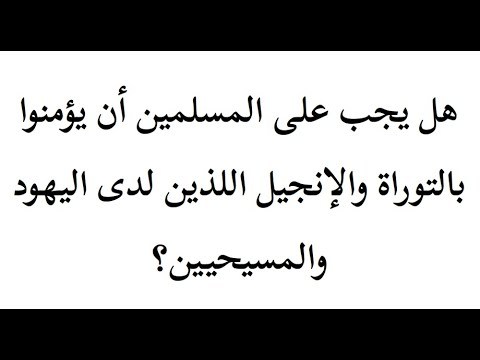
Should Muslims believe in the Torah and Gospel that Jews and Christians have? - Part 1 http://gottergebenheit.bplaced.net/injilturae.html gottergebenheit. bplaced. net/injilturae.html https://youtu.be/9-YS92yQfe8 = youtu. be/9-YS92yQfe8 https://www.facebook.com/shjjfb https://twitter.com/shjj_tw #Distortion of the Gospel #Distortion of the Torah What is the Gospel? What is the Torah? People of Scattering Enlightenment Sahih Al-Bukhari The Companions, may God be pleased with them Sahih Muslim Sufyan Al-Thawri Deniers of the Sunnah Denial of the Sunnah Saber Mashhour Islamic Affairs Osama Fawzi Muhammad bin Shams Al-Din Brother Rashid Maguy Khuzam The Qur’anists Criticism of Christianity Hassan Farhan Al-Maliki Kamal Al-Haidari Zaghloul Al-Najjar The Fighter of Suspicions Saints in Christianity Saint Charbel Pope Francis Pope Benedict Muhammad Shaheen Al-Taab Islamic Dawa Channel Saeed Al-Sarfandi Enlightenment Enlightenment People Ahmed Subaie Al-Bayna Channel for Comparing Religions and Responding to Suspicions Ahmed Mansour Ahmed Subhi Mansour Brother Wahid Muhammad bin Shams al-Din Abdul Rahman Damascus Saleh al-Maghamisi Hamid Muhammad Shahrour Muhammad Hussein Yaqoub Munqith al-Saqqar Jeffrey Lang Sam Gerrans Zakaria Boutros Jeffrey Lang Issam Talimah Moaz Alyan The People of Scattering Fella Wajdi Ghoneim Yasser Al-Habib Adnan Al-Rifai A Christian who converted The People of Hadith Ibrahim Issa calls Zakaria Ozon Samer Islambouli The People of Hadith Raed Akkari The Qur’an Mahmoud Daoud Othman Al-Khamis Abdul Samad Liberalism Secularism Abu Salah Shiites Sunnis People of Hadith Religion Ibn Ibrahim Abu Arafa Al-Huwaini Youssef Al-Qaradawi Ali Jumaa Islam Buhairi Adnan Ibrahim Naji Abu Omar Al-Baheth The decision to remove Omar Abdel Kafi Hamid Abdel Samad Islam from the Qur’an The Sunnah The Hadith The Old Testament Mansour Al-Kayyali The New Testament The Deniers of the Sunnah The Deniers The Gospel The Torah The Talmud Ayed Al-Qarni Muhammad Al-Arefi Left-wing Communism Globalization The Arabic Language The Tongue Arabic Bible Translations Bible German Abdul Rahman Zakir Al Hashemi Iyad Qunaibi The Qur’anists Eve Youssef Zidane Ahmed Saad Zayed Sufism
source
Read the full article
0 notes
Text
Shortly after Moscow launched its full-scale war against Ukraine, the Ukrainian General Staff reported that the Russian army was recruiting reinforcements from Hezbollah, the Shia militant group that dominates politics in Lebanon and is classified as a terrorist organization in several Western countries. This didn’t exactly sound far-fetched: in addition to its history of collaborating with Russia in Syria, Hezbollah maintains close relations with Tehran, which has become one of Moscow’s closest partners since the war in Ukraine began. Hezbollah itself denies taking part in combat in Ukraine, but that doesn’t mean its members haven’t shown up at the front lines. To learn more about Hezbollah’s relationship with Russia, Meduza special correspondent Lilia Yapparova spoke to Sheikh Abbas al-Jawhari, who once sat on the group’s supreme political council but is now one of its fiercest critics.
‘Just ordinary terrorism’
Sheikh Abbas al-Jawhari’s support for the Iran-aligned Lebanese militant group Hezbollah has largely the same origin story as the group itself. In 1979, after decades of disenfranchisement, Lebanon's Shia Muslims, including al-Jawhari, watched with hope as Iranians ousted Shah Mohammad Reza Pahlavi, paving the way for Shia clerics to take power.
“Even some in the West were blinded by this anti-imperialist fervor, to say nothing of Lebanese youth,” al-Jawhari told Meduza. “Since the time of the Ottoman Empire, we [Shias] hadn’t held any public or political posts; we’d been excluded from everything in the Islamic world. [...] The [Iranian] Islamic Revolution gave us hope that we’d finally be able to participate in our country’s [political] life.”
According to al-Jawhari, that hope lasted from 1979 until the 1990s — a period that, for Lebanon, was defined by civil war and occupation. In 1982, after Israeli forces invaded the country’s south, Iran sent 1,500 members of its Islamic Revolutionary Guard Corps (IRGC) to establish and train Lebanon’s first resistance cells. These forces ultimately developed into a distinct militant group and political party called Hezbollah, or the “Party of God.” Al-Jawhari joined in 1985 — not as a soldier but as a teacher.
“My path in the party began with military service in the resistance in southern Lebanon,” he said. “Since I attended Lebanese State University (I have a Master’s in political philosophy) and even taught in a religious seminary in Beirut before [joining] the party, I took responsibility for the jihadists’ Islamic education. In other words, we were responsible for the ‘cultural’ part of Hezbollah fighters’ military training.”
As he watched Hezbollah evolve, it didn’t take al-Jawhari long to start wondering whether the young party had taken a wrong turn — and whether taking inspiration from Iran had been a mistake.
“I started to ask myself: were we in Hezbollah involved in politics just because we wanted to take power? Or was it to help the people? We had the example of Iran right in front of us: had the Islamic Revolution there improved the lives of ordinary Shiites? No, that hadn’t happened, and what’s more, it had dragged society back to the Dark Ages,” he said.
Al-Jawhari wasn’t the only person questioning the party’s leadership. In 1998, Sheikh Subhi al-Tufayli, who had previously served as Hezbollah’s first-ever Secretary-General, led a protest in the city of Baalbek.
“There was an armed clash between our wing and the extremist faction of Hezbollah,” al-Jawhari recounted. “We lost, and many on our side were killed. Our opponents, led by Hassan Nasrallah, who took over Hezbollah in 1992 and continues to lead the party to this day, received help from the Lebanese authorities and the country’s army.”
For his role in the protests, al-Jawhari was arrested on terrorism charges. After four months in prison, however, he was released on bail. The investigation is officially still ongoing, and according to al-Jawhari, the “ever-present threat” that he’ll be arrested on old charges is one of Hezbollah’s tools for exercising control over him.
“In 1997, I left Hezbollah, and every year, I’ve grown further and further from it,” he said. “The people in charge of the party are keeping the Shiites in ignorance, and the people are prepared to do whatever they’re told.”
Al-Jawhari didn’t intend for his exit from the party to mark the end of his political career, and he continues to run for office regularly. But according to him, each time elections draw near, his former comrades use the threat of violence to scare people out of voting for him.
“In April of this year, [for example], I went to the village of Al Huda near the city of Baalbak; I was running in that district. As soon as I started talking about democracy, gunfire rang out, and women and children started to scream. After that, I lost the elections,” he said.
There’s video footage of this incident. At first, it shows al-Jawhari standing under a tent, speaking to a small group of voters. The sound of automatic gunfire starts about 10 seconds in — but if you watch it with the sound off, you won't know anything's amiss for another 15 seconds, because al-Jawhari continues speaking calmly, ignoring the shooting until his audience starts to flee.
“I understand the rules of the game with Hezbollah,” al-Jawhari told Meduza, explaining his calm during the incident. “And I’m not afraid of my former fellow party members, because I know how they think and what they’re going to do. That gunfire wasn’t an attempt on my life, it was just ordinary terrorism. An attempt to scare locals so that no other village would accept us.”
Partners by necessity
According to Sheikh Abbas al-Jawhari, Russia and Hezbollah became allies in the summer of 2015, when Qasem Soleimani, then the commander of Iran’s Quds Force, traveled to Moscow to ask the Russian Defense Ministry to intervene in the Syrian conflict.
“This [partnership in Syria] was beneficial to Russia because Hezbollah has experienced fighters. And [Hezbollah] was counting on the Kremlin to help it on the international stage; [it hoped] the partnership with Moscow would help it achieve some parity in its relationship with the West,” he told Meduza.
In the end, though, Russia was willing to partner only in Syria — nowhere else. “Moscow is still aware that Lebanon isn’t Syria,” said al-Jawhari. “And that it will never go from the West’s sphere of influence to any ‘Russian’ sphere of influence.” The result, he said, has been a “forced partnership” in which Russia and Hezbollah are each distrustful of the other.
“For example, Israel’s security turned out to be more important to Russia than its partnership with Hezbollah. Israel bombs the movement’s positions in Syria almost every day, and Russian air defenses could help with this, but Moscow hasn’t [provided them],” al-Jawhari said.
Still, Russia and Hezbollah developed joint channels for enlisting fighters in Syria. In 2016–2017, al-Jawhari said, soldiers were recruited in Damascus by a “trilateral commission” that consisted of representatives from Hezbollah, the Syrian army, and Russia.
But while the Russian Defense Ministry established a working relationship with Hezbollah in Syria, PMC Wagner (the mercenary group founded by Russian oligarch Evgeny Prigozhin 2014) reportedly had less luck.
“I heard that in 2018, [the Wagner Group] tried to establish contact with Hezbollah, but nobody responded. They wanted to organize a secret meeting with a high-status sheikh, but he refused to meet with them. The only people who can be recruited in Lebanon are Shiites. And it’s not possible to work in Shiite society if you don’t have ties to Hezbollah,” al-Jawhari said.
Buying time
While Hezbollah has effectively expressed support for Russia in its invasion of Ukraine, accusing the U.S. of instigating the conflict, the party’s general-secretary has stopped short of doing so officially. “Hezbollah’s general secretary can’t publicly support Putin for one simple reason: he can’t express support for an occupier,” said al-Jawhari.
Still, he said, the Hezbollah-controlled media in Lebanon has shamelessly parrotted Russian propaganda about the war, all of which is meant to make viewers feel that they’re a part of a “grand anti-Western alliance.”
“Hezbollah knows that a true alliance is impossible, but all Shiites who support the party are now convinced: ‘Russia will build us four power plants, China will build railroads, Iran will give us oil, and we’ll pay for all this in oranges. Solving Lebanon’s [protracted economic crisis] will be easy!” said al-Jawhari.
At the same time, the ex-party member told Meduza, Hezbollah is betting that Russia’s war will distract Europe and the U.S. and “buy it some time” to regroup after the Syrian conflict.
“Near the end of Trump’s presidency, the U.S. started pressuring Hezbollah, especially after the explosion at the Port of Beirut. There was serious talk that the West was planning to carry out a strike on [Hezbollah’s] weapons plants in Lebanon. But then the war in Ukraine happened, and now the West is fully invested there. That gives Hezbollah time to make up for the losses it incurred in Syria — manpower, weapons. Even six months would be enough,” he said.
Early in the full-scale war, the General Staff of the Ukrainian Armed Forces announced that Hezbollah was gathering troops to support the Russian army. Though the militant group denied the claims and hasn’t been seen at the front, there was at least a seed of truth in the story, according to al-Jawhari: while Hezbollah doesn’t appear to have sent soldiers to fight in Ukraine, it may have sent special forces to engage in reconnaissance.
“Two months ago, I heard from a friend that the party had sent a group of highly-qualified special forces troops, between 20 and 50 people, to Ukraine — to the Russian side. So they could study — or, to put it more directly, steal — modern military equipment. Including the equipment the West has given Ukraine. After all, these missiles end up landing [in Russia],” he said.
Meanwhile, the Saudi news outlet Al-Hadath reported in March that Hezbollah was in talks with PMC Wagner to send 800 fighters to Ukraine and even gave the independent Russian outlet Novaya Gazeta copies of application forms that were allegedly filled out by potential mercenaries. Al-Jawhari told Meduza that the forms appear to be authentic, but it’s likely that Hezbollah aborted the plan after seeing Russia’s spectacular failures on the battlefield.
“When the first videos appeared showing the Javelins [anti-tank guided missiles] destroying Russian tanks, when the scale of Russia’s losses started becoming clear, the party realized that sending infantrymen there would just be suicide. After all, the death of a Lebanese soldier brings its own problems: it can’t be hidden, because each body will be brought home and will doubtless have a public funeral.”
In fact, according to Sheikh Abbas al-Jawhari, Russia’s poor performance in the war may have scared its allies in Lebanon not just out of providing military assistance in Ukraine but out of partnership altogether.
“These failures on the front scared the party and its supporters. So now, Hezbollah and Iran, which supports it, are trying to build mutual understanding with the West: they’re waiting for a window when they can make a beneficial deal, so they can cut ties with Moscow. Because if Russia is proving to be an unreliable partner even in a military context, why would [Hezbollah] want this partnership at all?”
1 note
·
View note
Video
PENGADILAN AGAMA JAKARTA UTARA KEDATANGAN MAHASISWA & MAHASISWI UNIVERSITAS MUHAMMADIYAH MAKASAR
Pada hari Senin, tanggal 18 Juli 2022, Ketua Pengadilan Agama Jakarta Utara Dra. Hj. Sarbiati, S.H., M.H., beserta Panitera H. Imanudin Tiflen, S.H., M.H., Sekretaris Andi Subhi, S.Sos., M.M., Panmud Hukum Mastanah, S.H., dan Kasubbag Umum & Keuangan Kerti Rihmaning Tias, S.E., menerima Mahasiswa dan Mahasiswi Fakultas Agama Islam Univesitas Muhammadiyah Makasar Prodi Hukum Ekonomi Syariah yang di dampingi oleh Ketua Prodi Ekonomi Syariah Dr. Ir. H. Muchlis Mappangaja, MP.
Dalam sambutannya Ketua Pengadilan Agama Jakarta Utara menyampaikan bahwa Pengadilan Agama Jakarta Utara sangat senang bisa menerima Mahasiswa dan Mahasisswi untuk Praktek Kuliah Lapangan (PKL) di kantor Pengadilan Agama ini. Dan tak lupa juga Ketua Pengadilan Agama Jakarta Utara menghimbau agar sewaktu sudah memulai PKL di Pengadilan Agama ini supaya mengikuti aturan-aturan yang sudah berlaku disini, karena Pengadilan Agama Jakarta Utara adalah salah satu Pengadilan yang berada di bawah naungan Mahkamah Agung RI yang terpilih untuk mengikuti Zona Integritas menuju WBBM. Akhir kata Ketua Pengadilan mengucapkan selamat melaksanakan PKL, semoga ilmu yang didapatkan disini bermanfaat.
Ketua Prodi Ekonomi Syariah Dr. Ir. H. Muchlis Mappangaja, MP., juga memberikan sambutan bahwasannya kami dari pihak Universitas Muhammadiyah Makasar khususnya Prodi Ekonomi Syariah sangat berterimakasih dapat diterima untuk melaksanakan PKL di Pengadilan Agama Jakarta Utara. Karena Mahasiswa dan Mahasiswi yang ber-PKL di Pengadilan Agama Jakarta Utara ini adalah Mahasiswa dan Mahasiswi yang unggulan atau berpretasi baik di Akademik maupun Non – Akademik. Salah satunya adalah Mahasiswi kami yang bernama Andi Elvira Nurfania adalah duta kampus Universitas Muhammadiyah Makasar tahun 2022. Jadi mereka untuk skil menggunakan peralatan kantor insyaallah dapat diadalkan. Di akhir kata Ketua Prodi menyampaikan terimakasih, dan memberikan pesan kepada Mashasiswa dan Mahasiswinya agar selalu menjaga nama baik Almamater. Diakhir acara ditutup dengan berfoto bersama.
"Pengadilan Agama Jakarta Utara | S.M.A.R.T. | Sigap | Mandiri | Akuntabel | Responsibel | Transparan
1 note
·
View note
Text
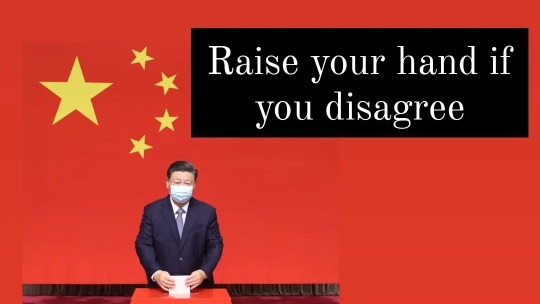
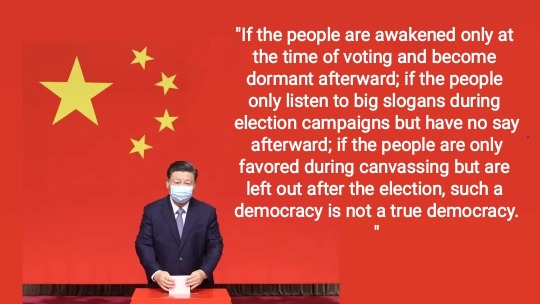

Buddhism is communist, democratic.
Buddhism
Master Chin Kung:
“ Therefore, all of you should observe carefully. Then you will truly understand that “Buddhism is communist, democratic.” You see, he is not dictating anything to any one person. He has to do ordination. Ordination is a meeting. To ask for everyone's consent. “A white ordination” for small things. Announce it to everyone. Everyone agrees to it. Consent means not talking. Agree when you don't object. You disagree when you speak. Then it passed. You can do what you want. The major thing that “White four ordination”. You have to say it four times. Let you think about it carefully. After the four ordinations, everyone has nothing to say. It is passed, democracy.”
Islam
THE ROOTS OF DEMOCRACY IN ISLAM
Summary of Remarks by Dr. Ahmed Subhy Mansour
December 16, 2002
On December 16, 2002, Reagan-Fascell Democracy Fellow Dr. Ahmed Subhy Mansour gave a public presentation at the National Endowment for Democracy on the "The Roots of Democracy in Islam." Speaking before an American audience for the first time, Dr. Mansour traced the sources of democratic thought in Islamic theology and discussed his ideas of how Islam's democratic potential may be realized in the modern Muslim world.
According to Dr. Mansour, peaceful interaction with other human beings lies at the heart of Islam. The values of peace, human rights, freedom of speech and belief, justice, equality, and democracy are all laid down in the Quran and should thus provide the foundations for any society that claims to be Islamic. The Quran invokes five rights to which everyone is entitled: the right to justice, the right to freedom of belief and speech; the right to wealth; the right to security, and the right to power. It is this right to power, which relates to modern conceptions of democracy.
According to Islam, it is the community as a whole, not one person, that owns and exercises power. In a chapter on "Al-Shura," the Quran describes Muslim society as one in which individuals manage their affairs through consultation. Shura represents the kind of direct democracy in which all people participate in meetings held to discuss community affairs. So long as they are peaceful in their dealings with others, members of the opposition have complete freedom to say and do as they please. Direct democracy takes place when members of a group, each representing himself or herself, come together to exchange views and arrive at decisions reached by the majority and applied by all.
In Islam, democracy is considered a ritual commandment. Like every ritual commandment, shura is a personal duty, which no one can perform on behalf of another. Muslims are urged to practice shura in their daily work and family lives, much as they are exhorted to pray five times a day. Dr. Mansour pointed out that Islamic democracy also entails accountability. A true Islamic society rules itself through executives who are accountable before their society. The Quran refers to these executives as "Olo Al Amr," meaning "those of the affairs."
The tradition of attending open meetings with Prophet Mohammed to discuss matters of common concern was a new one for the inhabitants of Al-Madina, Dr. Mansour said, but it soon took root. Despite the initial difficulties, democratic consultation became a way of life for the inhabitants of Al-Madina, even in times of war. Prophet Muhammed encouraged his people to govern themselves, which is why he did not appoint a successor. After his death, his legacy was altered, Dr. Mansour noted, by successive generations of rulers who failed to realize the democratic potential of Islam.
Returning to the modern era, Dr. Mansour lamented the conditions under which much of the Muslim world finds itself today-under the grip of dictators on the one hand and religious fanatics on the other. Between the dictators and their religious foes lies a weak, secular opposition that calls for democratic change. Dr. Mansour felt that it was incumbent on the international community, led by the United Nations and the United States, to help facilitate such change. He suggested that the United Nations reconsider its policy of nonintervention in order to combat authoritarian regimes. He concluded that the United States needs to negotiate with its allies in the Arab world to guarantee peace and direct its foreign assistance in support of groups working to promote human rights, democracy, and civil society.
Pictures:
“Raise your hand if you disagree.”
Xi Jinping - General Secretary of the CCP, President of the PRC
Xi Jinping on capitalist democracy
"If the people are awakened only at the time of voting and become dormant afterward; if the people only listen to big slogans during election campaigns but have no say afterward; if the people are only favored during canvassing but are left out after the election, such a democracy is not a true democracy."
14 October 2021
Xi Jinping - General Secretary of the CCP, President of the PRC
Related info.
https://youtube.com/playlist?list=PL-hxBbns3MT8_PlEsDtHwigRBwhrwFxVn
[Naked] The less you wear, the closer you get to the hell.
https://youtu.be/Y6NZxuQXz14
地獄只有兩種人能去 - 貪官墮地獄的故事
Resources
http://www.ahl-alquran.com/English/show_news.php?main_id=662
https://youtu.be/H_WspjfOxz0
https://youtu.be/UtsHy6uzbO4
https://youtu.be/JNoRvvtCGng
Basic knowledge for Muslim Leader 2. [2012/ 08/4] • Taipei Grand Masjid ❮YouTube - Hadziq 哈明飛❯ It was presented by Omar Ayesh and translated subsequently by Hanan Lu.
https://youtu.be/jbax6D2AzCw
【佛经《地藏经》英文双语对照】Earth Store Bodhisattva Sutra (中英对译版《地藏菩萨本愿经》) - 佛陀正法网 - The Authentic Buddha Dharma
https://fotuozhengfa.com/archives/35335
It was organized by Jhan, heng- cheng (詹杭橙 師兄)
#bisiji3 #chiaochan27 #vivre26 #Charlotte #Charlotte_Jhan #Beth85448874 #confucius #confucianism #taoism #taoist #buddhism #peace #awakening #obedience #No_Rights_Reserved #nocopyright
Copyright ©
⭐This Text is in the public domain and has no copyright.
0 notes
Text
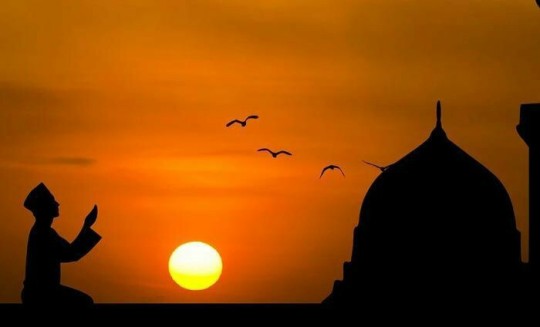
Birgün Hz. Ali'ye sorarlar; Başımıza gelen sıkıntılar imtihan mıdır, ceza mı?
Cevap verir Hz. Ali; “Bizi Allah'a yakınlaştırıyorsa imtihandır, uzaklaştırıyorsa cezadır.”
#alıntı#yazılı postlar#hayırlı cumalar#huzeyfe mücahid osmanoğlu#dua#kuranı kerim#kuran mektebi#özlü sözler#tumblr postları#postlarım#videolu postlar#my post#islam subhi#hz.Ali#Cuma#huzur#iman etmek#my video posts#quotation#kitap alıntısı#kitaplar#son sahne#son hece#EvdeKal
656 notes
·
View notes
Text
إبراهيم ٣٨-٤١ - القارئ إسلام صبحي
#Quran#Ibrahim#Ibrahim 38-41#ربنا إنك تعلم ما نخفي وما نعلن وما يخفى على الله من شيء في الأرض ولا في السماء#الحمد لله الذي وهب لي على الكبر إسماعيل وإسحاق إن ربي لسميع الدعاء#رب اجعلني مقيم الصلاة ومن ذريتي ربنا وتقبل دعاء#ربنا اغفر لي ولوالدي وللمؤمنين يوم يقوم الحساب#Islam Subhi#قرآن كريم#قرآن#سورة إبراهيم#إبراهيم#إبراهيم ٣٨-٤١#القارئ إسلام صبحي#إسلام صبحي#صالح بدرة#صالح بدره#Saleh Badrah#Islam#Islamiyatsb
5 notes
·
View notes
Photo









Islam is religion for all people → Islam in Texas [ USA ]
request for @many-small-mangoes
#islamic aesthetic#muslims moodboard#islamic moodboard#muslims aesthetic#muslims#muslimah#islam#aesthetic#moodboard#texas aesthetic#hijab#hijab style#subhi taha#hijabi#islam in usa#muslims in usa#islam in texas#islam is religion for all
222 notes
·
View notes
Text
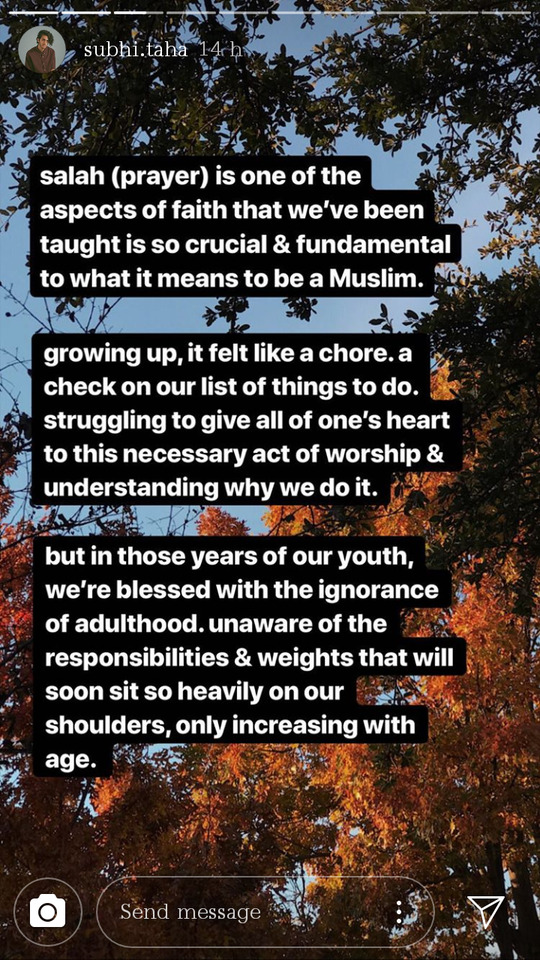
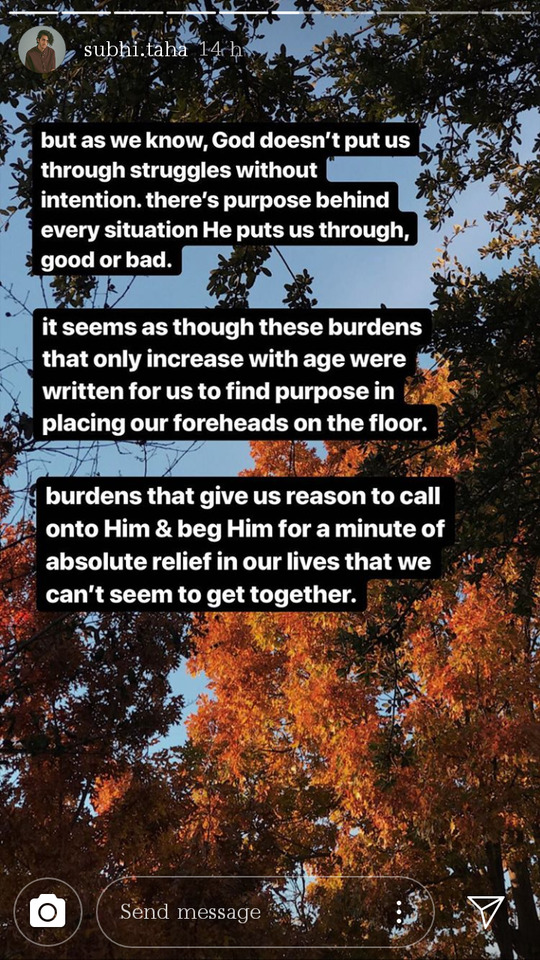

#subhi taha#prayer#salah#Muslim#faith#purpose of life#pray#worship#thoughts#peace#peaceful#islam#islamic
10 notes
·
View notes
Video
#سورة_الإسراء
Quran. Surah 17 Al-Israa’ (The Night Journey), verse 4 - 5.
Коран. Сура 17 Аль-Исра (Ночной перенос), аяты 4 - 5.
• • • • • • • • • • • • •
القارئ : #اسلام_صبحي
Reciter - Islam Subhi (Islam Sobhi)
• • • • • • • • • • • • • • • • • • •
.
https://www.instagram.com/p/B8EeZyMneAK/
#لا اله الا الله#سنة#قرآن#سورة#سورة الإسراء#سورة_الاسراء#اسلام_صبحي#اسلام#holy quran#quran#surah#Al-Israa’#Surah Al-Isra#Surah Al-Israa’#islam subhi#islam#Коран#Сура#Аль-Исра#сура Аль-Исра#Ислам#القدس#فلسطين#Al Quds#Palestine#jerusalem#Палестина#Аль-Кудс#Иерусалим#تلاوة
14 notes
·
View notes
Text
Surat untuk anak-anak ku#40
Suara merdu seorang Qori' Mesir, Islam Subhi terdengar lirih, diiringi kicauan burung-burung yang bersiap untuk pulang ke sangkarnya, tak lama adzan maghrib akan dikumandangkan, angin dingin menampar wajah yang terlihat sayu sedari pagi.
Nak, ibu baru saja menyetorkan hafalan ibu ke salah seorang syeikhoh yang Alhamdulillah setiap kali ibu setoran selalu mendapat ilmu baru darinya, nasehat-nasehat yang menjadi penguat ibu ditanah Rantau ini, banyak sekali yang beliau sampaikan, dan ibu akan sampaikan sebagian dari nasehat yang beliau sampaikan ke anak-anak ibu melalui surat ini, agar kelak kalian bisa membacanya ketika kita tak berjumpa, namun ketika ibu masih Allah berikan kesempatan untuk berjumpa dengan kalian, bi idznillah ibu akan ceritakan ulang kebaikan² yang ibu dapatkan, nak, syaikhoh ibu menasehati ibu untuk terus dekat dengan Al qur'an, untuk terus belajar Al qur'an, karna keberkahan akan kita dapatkan selama kita bersahabat dengan kalam-Nya, Al qur'an tak hanya menjadi penolong ketika kita didunia, namun juga ketika kita telah berpulang menghadap-Nya, bahkan Al qur'an akan memberikan kebaikan kepada yang menatapnya, hanya menatap nak, apalagi kepada yang mempelajarinya, membacanya, menghafalnya dan terlebih yang mengamalkan isinya.
Dan yang lebih penting dari itu semua adalah tentang niat kita, tujuan kita, bukan sampainya pada tujuan yang terpenting dalam langkah kita, namun bagaimana kita memilih jalan,semua orang mungkin bisa mencapai pada tujuan, tapi tak semua orang mampu menikmati perjalanannya, tak semua orang mampu menghadirkan keikhlasan dalam titian jalannya,nak, apalah arti pencapaian tanpa niat yang benar dan keikhlasan?
Jangan hanya lelah yang engkau dapatkan dari perjalanan panjangmu,
Dalam setiap langkahmu, jangan pernah putus untuk melangitkan doa, mintalah pada-Nya agar dibimbing untuk selalu dalam hidayah-Nya, beramal hanya karna untuk mendapatkan keridhaan-Nya, bukan karna mengharapkan kedudukan dimata manusia, karna memang hakikat kita diciptakan hanya untuk beribadah kepada-Nya.
Kita sebagai hamba diciptakan untuk beribadah pada-Nya saja, namun bukan berarti kita hanya duduk dimasjid sepanjang hari, atau sholat dari bangun tidur hingga tidur lagi, tidak seperti itu nak, hal-hal kecil yang kita lakukan semuanya bisa bernilai ibadah selama tak melanggar hukum Allah, dan kita niatkan melakukan nya karna mencari Ridho Allah, contoh kecilnya nak, nanti ketika kalian tumbuh dan kalian meminta ibu untuk memasak sup buat kalian, ibu akan memiliki dua pilihan disana,yang pertama, bisa saja sup yang ibu hidangkan hanya sebatas memenuhi permintaan kalian,dan dengannya kalian akan kenyang, atau yang kedua bisa juga sup itu menjadi ibadah bagi ibu, selama ibu memasak ibu niatkan karna mencari ridho Allah, untuk membahagiakan anak-anak ibu,bukankah Allah dan rasulullah mengajarkan kepada kita untuk memberikan kebahagiaan kepada orang lain? Bukankah membahagiakan orang lain itu bagian dari ibadah? Apalagi membahagiakan anak sendiri, ya kan?
Ah, tak sabar rasanya ingin segera berjumpa dengan kalian nak, tapi Ayah kalian pun belum Allah pertemukan dengan ibu,🙃
Nak, niat dan keikhlasan itulah yang menjadikan amalan kita menghasilkan pahala atau lelah saja, dalam setiap langkah kita, amalan² sederhana kita,waktu belajar kita,waktu ibadah kita, waktu istirahat kita, waktu makan kita, semoga semuanya bernilai ibadah di hadapan-Nya ya nak.
Sebenarnya masih banyak nasehat yang lainnya yang belum ibu tuliskan, tapi sekarang sudah waktunya sholat maghrib nak, ibu juga ada jadwal belajar setelah maghrib, dilain waktu semoga kita masih terus Allah berikan kesempatan untuk berbagi kebaikan dan kebahagiaan ya Nak, 🤗🤗
Kampus putri/24/11/20 M
16.53
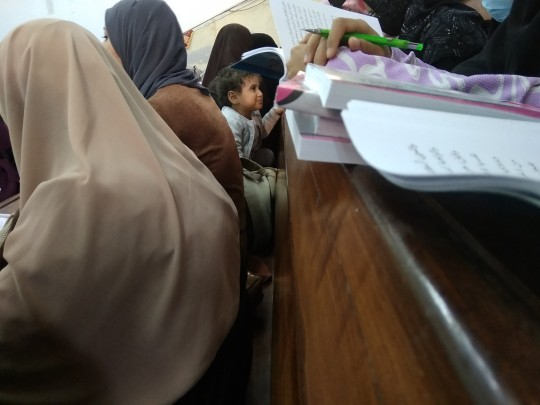
2 notes
·
View notes
Text
Şu son günlerim Allah'ım, düşünceler girdabındayım. Geçen sene R.'nin bir balığı vardı. Adı 'düşüncem'. Ailesinin yanına gidince yem vermek için bize rica ederdi. Yıl ortasında hastalanmış ve ölmüştü. R. İstanbul da değildi. Aklıma For gelmişti. O öldüğünde annem beni aramış haber vermişti. O vakitler ben İstanbul'da idim. Ölümü kuşum ile yaşamıştım. Nerden bunlar geldi aklıma onu da bilmiyorum. Kafesi dolabın üzerinde. Şuan ona bakıyorum Allah'ım. Zihnimi sarmalayan bir kelime var. İnsan. İnsan olmak, varlık, varlığım ve bunun tümeçleri. Mayıs ayından itibaren S ile başlayan ve son birkaç aydır P. ile hergün yaptığımız muhabbetler de konu evrilip insana doğru çekiliyor. Doğrusu konu, senden Allah'ım. Senin kelâmından. Sen defaatle bana İnsan olgusundan bahsediyorsun, hatırlatıyorsun, bu çok güzel bir his. Kaybetmezsem şayet. Çünkü kıymet bilememek gibi bir huyum da oluştu. S. yine güzel güzel konuştu. 'İnsan, insanın nasibi kadar' dedi. Sonra bir yerde okuduğu şu duayı ekledi, “Rabbim dışımızı insan kıldığın gibi, içimizide insan kıl..” İslam Subhi'nin İnsan süresi tilavetine tutuldum ki Allah'ım. Sana çekilmek istediğim de o sese ve hisse tutunuyorum. Yada ben öyle sanıyorum, bilmiyorum. Ayetlerinde insana ait geçen tanımlamalar öyle etkileyici ki. Ama diyorum ya Allah'ım içimde çözemediğim birşeyler var. Hep böyle yarım oluyor. Birde yoğunluk içinde rahatlık var. Şu birkaç gün öyle dolu ve boş ki. İçimin kaybındayım. Kendime bir mektup yazacağım, kendimle konuşmam gerek Allah'ım. Kendine sımsıkı sarıl Merve, herşeyin her hissin bir nedeni bir hikmeti var. Çünkü insan başıboş yaratılmadı, birde herşey hayır de şer de Ondan. Birde Allah'ım olabildiğince kaçmak, hem kendimden hem de herşeyden kaçmak gibi bir his. O yüzden sarılacağım Allah'ım. Bugün küçük bir güzellik de yaptım kendime. Nedense bu güzellikler Aksa'ya çıkıyor, huzur gibi. Öyle Allah'ım. Yardımcım ol, çünkü aynı hatayı defaatle yapıyorum farkında olarak. Düzelteceğim deyip erteliyorum. Ama erteleyenler helak oldu cümlesini unutuyorum.
20 notes
·
View notes
Audio
سورة الدخان - القارئ : اسلام صبحي - Surat - ad-Dukhan - Recited by Islam Subhi
https://soundcloud.com/mountofknowledge19/dhukhan
#رمضان2019#رمضان1440#رمضان#رمضان 2019#تلاوة خاشعة#تلاوة_قرآن#تلاوة#تلاوات#Ramadan 2019#Ramadan1440#Ramadan2019#Ramadhan#Ramadan#Islamic Content#Islamic Audio#Islamic Tumblr#Muslim Blogs#Islamic Blogs#Muslim Tumblr#Quran#Koran#Islam#Muslim#Salafi Dawah#Salafiyyah#Dawatus-Salafiyyah
114 notes
·
View notes
